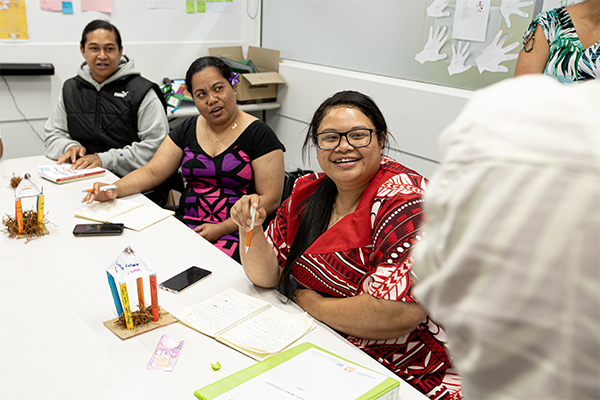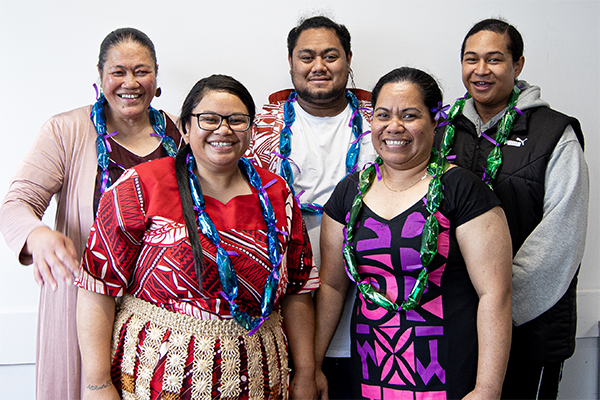Winner

A programme that looks at money management from a uniquely Pacific perspective not only improves the financial literacy of its participants, but increases their overall confidence, which in turn allows them to thrive in the workplace.
Project Ikuna is a culturally responsive learning programme delivering micro-credentials in financial and digital literacy to Auckland’s Pasifika workforce.
It’s delivered in a partnership between Upskills, a training consultancy specialising in building the communication skills of people in the New Zealand workforce, and Tātaki Auckland Unlimited, which is part of the Alo Vaka Pacific Skills Shift, a government-funded initiative connecting Auckland employers with education providers to provide short, in-work training courses for Pacific people.
Upskills began as a business run from its directors’ kitchen table eight years ago with one client, and has grown to providing services for more than 50 clients, with 10 staff in Auckland and a team of contractors around the country.
Programme Manager for Project Ikuna Tafa Iakopo says the goal of the programme is to grow the resilience of Tāmaki Makaurau’s Pasifika community in the face of technological and labour market change.
“A key consideration of the project was to include financial literacy delivered with Pacific culture front and centre,” she says.
Graduates from the project’s Future Ready: Money Confidence course connect with the Fonofale Wellbeing Model, a Pacific framework for understanding wellbeing, and are able to set financial goals, understand the concept of compound interest, keep a spending diary, harness the power of saving, identify the real cost of debt, write a family budget and understand the role of culture and values in finance.
Upskills was involved in in collaborating with other providers to complete the pilot phase with its client Van den Brink Poultry. Once it was completed, improvements were made before it was rolled out more widely with multiple providers and workplace organisations.
Tafa says Upskills’ point of difference when it comes to delivering the programme is embedding the Fonofale Wellbeing Model.
“Making a connection with our Pasifika learners through a Pasifika lens ensures connectivity and relevance of the delivered content. This has impacted positively on our target audience as they appreciate that their culture is embraced and not ignored. Acknowledgement of their cultural norms and how to work it into the budget has proved successful with the majority becoming more confident when it comes to spending their money.”
Participants often make changes to how they conduct their personal finances very early on in the course and the positive impact can be seen very quickly.
“The changes made might be considered small to start off with, however these small changes are quite impactful as it can be the difference between understanding needs and wants and using any excess for savings instead of treats,” says Tafa.
“Other benefits include increased confidence that in turn sees them thrive in the workplace.”

An important focus of the programme is providing a safe space where there is no judgement, so learners can gain the confidence to make wise decisions about their spending.
Planning ahead for anticipated fa’alavelaves (events such as weddings, funerals, birthdays, and unveilings that often require large sums of money) is discussed in detail and the learners are empowered to come up with realistic solutions that work for them and their families.
“The families of these learners are seeing the benefits of keeping costs down and being realistic with what they have,” says Tafa.
“One participant has taken on board the learnings and has changed the way they contribute to church family services by making curried eggs rather than spending a large sum on sandwiches or even prawns. He was shocked to see how such a simple, yet delicious, snack cost only cost a fraction of what they would normally spend. This same learner has now influenced close friends and family to open up savings accounts that are not to be touched.”
While the course covers the benefits of saving and spending wisely, there’s also an emphasis on encouraging participants to understand their own potential and recognise that the skills they may be using in their family and community life are also of value to their employers.
“Throughout course delivery, there is strong emphasis on concepts of ako and reciprocal learning. Pacific employees often have hidden skills and knowledge from what they do at home and in their community. When they are empowered to use those skills, businesses thrive and so do they,” says Tafa.






